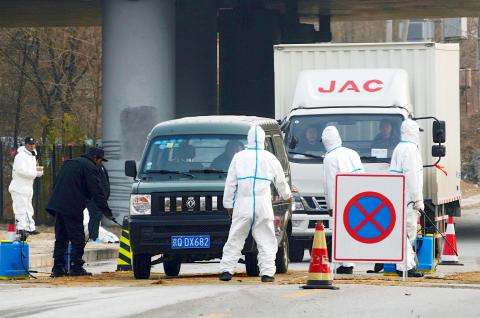A case of African swine fever has been detected at a Hong Kong slaughterhouse, prompting the culling of all 6,000 pigs at the facility.
Hong Kong Secretary for Food and Health Sophia Chan (陳肇始) said in a statement on Friday that the incurable virus was found in a single pig imported from a farm in Guangdong Province in mainland China, where the months-long outbreak has devastated herds.
Pork is China’s staple meat, and its price and availability is considered a matter of national concern. Shortfalls in supply have increased demand for pork from producers in the US, with whom China is in a trade dispute.

Photo: Reuters
The culling was necessary so that “thorough cleansing and also disinfection could be conducted,” Chan said.
Operations at the Sheung Shui Slaughterhouse would be suspended until the disinfection work is completed, she said.
“We will enhance the surveillance and also testing of pigs, and currently we collect samples from pigs with ASF symptoms for testing, and in the future we will step up the sampling of other pigs for testing,” Chan said, using an acronym for the disease.
The territory’s supply of fresh pork would be reduced in the near future, but there would still be a limited supply of live pigs available from another slaughterhouse, she said.
Unlike swine flu, African swine fever cannot be transmitted to humans.
Well-cooked pork is safe for consumption, Chan said.
Concerns about the spread of African swine fever to the US has led organizers to cancel the World Pork Expo scheduled for next month in Iowa.
Denmark has begun erecting a 70km fence along the German border to keep out wild boars in an attempt to prevent the spread of African swine fever, which could jeopardize the nation’s valuable pork industry.
Russia has also been hit hard by the disease and some have speculated that the Chinese outbreak might have originated among pigs from that country.

The US government has signed defense cooperation agreements with Japan and the Philippines to boost the deterrence capabilities of countries in the first island chain, a report by the National Security Bureau (NSB) showed. The main countries on the first island chain include the two nations and Taiwan. The bureau is to present the report at a meeting of the legislature’s Foreign Affairs and National Defense Committee tomorrow. The US military has deployed Typhon missile systems to Japan’s Yamaguchi Prefecture and Zambales province in the Philippines during their joint military exercises. It has also installed NMESIS anti-ship systems in Japan’s Okinawa

‘WIN-WIN’: The Philippines, and central and eastern European countries are important potential drone cooperation partners, Minister of Foreign Affairs Lin Chia-lung said Minister of Foreign Affairs Lin Chia-lung (林佳龍) in an interview published yesterday confirmed that there are joint ventures between Taiwan and Poland in the drone industry. Lin made the remark in an exclusive interview with the Chinese-language Liberty Times (the Taipei Times’ sister paper). The government-backed Taiwan Excellence Drone International Business Opportunities Alliance and the Polish Chamber of Unmanned Systems on Wednesday last week signed a memorandum of understanding in Poland to develop a “non-China” supply chain for drones and work together on key technologies. Asked if Taiwan prioritized Poland among central and eastern European countries in drone collaboration, Lin

TRAGEDY STRIKES TAIPEI: The suspect died after falling off a building after he threw smoke grenades into Taipei Main Station and went on a killing spree in Zhongshan A 27-year-old suspect allegedly threw smoke grenades in Taipei Main Station and then proceeded to Zhongshan MRT Station in a random killing spree that resulted in the death of the suspect and two other civilians, and seven injured, including one in critical condition, as of press time last night. The suspect, identified as a man surnamed Chang Wen (張文), allegedly began the attack at Taipei Main Station, the Taipei Fire Department said, adding that it received a report at 5:24pm that smoke grenades had been thrown in the station. One man in his 50s was rushed to hospital after a cardiac arrest

ON ALERT: Taiwan’s partners would issue warnings if China attempted to use Interpol to target Taiwanese, and the global body has mechanisms to prevent it, an official said China has stationed two to four people specializing in Taiwan affairs at its embassies in several democratic countries to monitor and harass Taiwanese, actions that the host nations would not tolerate, National Security Bureau (NSB) Director-General Tsai Ming-yen (蔡明彥) said yesterday. Tsai made the comments at a meeting of the legislature’s Foreign Affairs and National Defense Committee, which asked him and Minister of National Defense Wellington Koo (顧立雄) to report on potential conflicts in the Taiwan Strait and military preparedness. Democratic Progressive Party (DPP) Legislator Michelle Lin (林楚茵) expressed concern that Beijing has posted personnel from China’s Taiwan Affairs Office to its